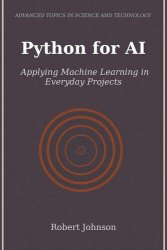 Название
Название: Python for AI: Applying Machine Learning in Everyday Projects
Автор: Robert Johnson
Издательство: HiTeX Press
Год: 2024
Страниц: 621
Язык: английский
Формат: pdf, epub (true)
Размер: 10.8 MB
"Python for AI: Applying Machine Learning in Everyday Projects" is a comprehensive guide designed for anyone keen to delve into the transformative world of artificial intelligence using the potent yet accessible Python programming language. This book meticulously covers essential AI concepts, offering readers a structured path from understanding basic Python syntax to implementing sophisticated machine learning models. With a blend of foundational theories and practical applications, each chapter deftly guides readers through relevant techniques and tools, such as TensorFlow, Keras, and scikit-learn, that are crucial for modern AI development.
Whether you are a beginner taking your first steps into AI or someone with programming experience seeking to expand your skill set, this book ensures you are equipped with the knowledge needed to tackle real-world challenges. It goes beyond mere theory, providing insights into deploying and integrating AI models, handling large datasets, and effectively developing solutions applicable across various industries. By the end of this journey, readers will not only grasp the intricacies of AI projects but also gain the confidence to innovate and contribute significantly to the evolving landscape of artificial intelligence.
Python has become a pivotal tool in the development and application of artificial intelligence due to its simplicity, readability, and a rich ecosystem of libraries that facilitate AI tasks. This chapter provides a foundational understanding of AI, exploring its definition, history, and how Python has emerged as a preferred language for AI applications. It examines Python’s role in AI development and highlights key libraries that form the backbone of AI projects. Additionally, this chapter touches on future trends that underscore Python’s significance in advancing AI technologies, setting the stage for more complex discussions and implementations in subsequent chapters.
Artificial Intelligence (AI) represents a paradigm shift in computational methodologies and technology applications, fundamentally altering numerous fields such as data science, robotics, and decision-making systems. AI encompasses a variety of concepts that allow machines to mimic cognitive functions typically associated with the human intellect, including learning, problem-solving, perception, and interaction. Understanding AI requires delving into its definition, historic milestones, key concepts, and implications in modern technology.
A pivotal moment in AI was the advent of Machine Learning, a subfield that empowers machines to improve performance on a specific task based on experience. It moves beyond pre-programmed behaviors to adapt and generalize knowledge from large datasets, an essential characteristic enabled by the rapid growth in computational power and accessibility to vast amounts of data. Machine learning itself can be categorized into supervised learning, unsupervised learning, reinforcement learning, and semi-supervised learning, each distinguished by their approach towards data utilization and the training process.
As AI systems evolved, the development of Deep Learning—a subset of machine learning involving neural networks with many layers—marked a renaissance in AI capabilities. Deep learning architectures, such as convolutional neural networks (CNNs) and recurrent neural networks (RNNs), have achieved state-of-the-art results in image recognition, speech processing, and beyond, facilitated by the integration of frameworks like TensorFlow and PyTorch.
Скачать Python for AI: Applying Machine Learning in Everyday Projects
[related-news]
[/related-news]